In this roundup of the Court Judgements, we look at the Supreme Court’s observations on indefinite adjournments in the matters of personal liberty, the importance of Gender Equality in Local bodies; the Andhra Pradesh High Court’s observation on the Right to Protest when the matter is sub-judice; the Bombay High Court’s remarks on the slum development schemes and the Manipur High Court’s judgement on the corrupt practices in the Representation of People’s Act, 1951.
SC: Indefinite adjournment in anticipatory bail matter is detrimental to valuable right of a person
During the hearing of the Special Leave Petition (SLP) filed by the petitioner in the Rajesh Seth vs. State of Chhattisgarh, the Supreme Court Bench headed by the Chief Justice of India and comprising of Justice Hima Kohli and Justice AS Bopanna, observed that the indefinite adjournment in matters relating to anticipatory bail is detrimental to the valuable right of a person.
The apex court was hearing a special leave petition filed by the Rajesh Seth, regarding the grant of anticipatory bail. The petitioner filed for an anticipatory bail under Section 438 of Code of Criminal Procedure (Cr.PC), along with an interlocutory application (IA). Though the High Court admitted the application, the matter did not get listed till the date of filing of SLP by petitioner and no interim protection is granted, even though the co-accused in the same FIR was granted interim protection.
The bench headed by CJI NV Ramana observed that such delays, particularly in matters of anticipatory bail are not acceptable. Further the court remarked that,
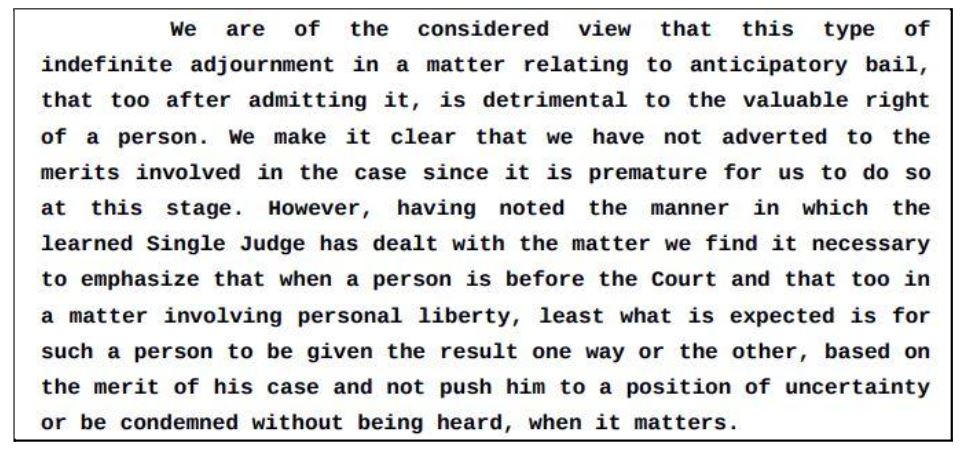
Accordingly, the apex court granted the interim protection, along with requesting the High Court Bench to dispose of the anticipatory bail petition within a period of two weeks from the date of receipt or production of copy of this order.
SC: ‘Important aspect of Gender Equality getting postponed’, SC asks Nagaland government to implement 33% reservation for women in local bodies.
In Peoples Union for Civil Liberties (PUCL) & Anr. vs. The State of Nagaland & Ors., the Supreme Court bench headed by Justice Sanjay Kishan Kaul and MM Sundresh, issued directions to the Government of Nagaland on how it intended to implement the 33% reservations for women in the local bodies, within six weeks. The apex court had also regretted that the important aspect of gender equality is getting postponed.
The apex court was hearing a petition filed by PUCL challenging the Assembly’s resolution dated 22 September 2021, which exempted the operation of part IXA of the Indian Constitution. This part deals with the municipalities and town councils. The advocate general, in December 2021, stated that the state formed a committee with an objective of holding elections to municipalities and town councils in accordance with the Nagaland Municipal (First Amendment) Act, 2006. Accordingly, the case was listed in February 2022.
During the hearing, the court had perused the note filed by the State Election Commission (SEC) and remarked that the report reflected the lackadaisical attitude by the state government in furthering the assurances made, in addition to the legal procedures to be followed. The State Election Commission’s report mentioned about the issues of fresh revision of E-rolls for new municipal councils as well as the legislative changes required to adopt the electoral rolls of legislatures for local body elections. The grievance made out is that the State Government is not responsive to the requests of SEC.
Justice SK Kaul remarked that the local issues cannot be gender negative and the apex court will supersede and proceed judicially if the state government doesn’t remove the resistance by power centres to bring in the equal norms. The bench also warned the State Government that any non-compliance would be treated as the violation of court’s orders.

Andhra Pradesh HC: Right to Protest not lost merely because same issue is pending before a Constitutional court.
During the hearing of a writ petition, K V Krishnaiah vs. State of Andhra Pradesh, a bench headed by Justice Ahsanuddin Amanullah and B.S. Bhanumathi of the Andhra Pradesh High Court remarked that a person’s right to protest is not disentitled automatically merely because the person approached the constitutional court on the same subject.
The court was hearing a petition filed to declare the G.O. Ms No1 of the Government of Andhra Pradesh, published in Notifications by Government vide No.51, Amaravati, Monday, 17 January as illegal. The Advocate General (AG) argued that the right to freedom of speech and expression is not an absolute right, and it was not proper for a government employee to call for a strike, particularly when the matter is already called upon by the court.
The Supreme Court in T K Rangarajan vs. Government of Tamil Nadu (2003), held that there is no fundamental right, or a moral or equitable justification to go on strike. This position is taken by the apex court in multiple instances, such as the Kameshwar Prasad vs. State of Bihar(1962) and the All India Bank employees Association vs. National Industrial Tribunal (1961), where in the apex court mentioned that even the liberal interpretation of fundamental right to form union does not carry itself the fundamental right to achieve every object for which it is formed.
In the writ petition filed by Kisan Mahapanchayat & Anr. vs. Union of India & Ors. (2021), the apex court examined the issue whether protests can be allowed when the matter is subjudice. Though the final verdict is not yet out, the bench orally remarked that a party that has approached the court cannot exercise the right to protest. In the Mazdoor Kisan Shakti Sangathan vs. The Union of India & Anr (2018), the apex court called for balancing of the fundamental rights.
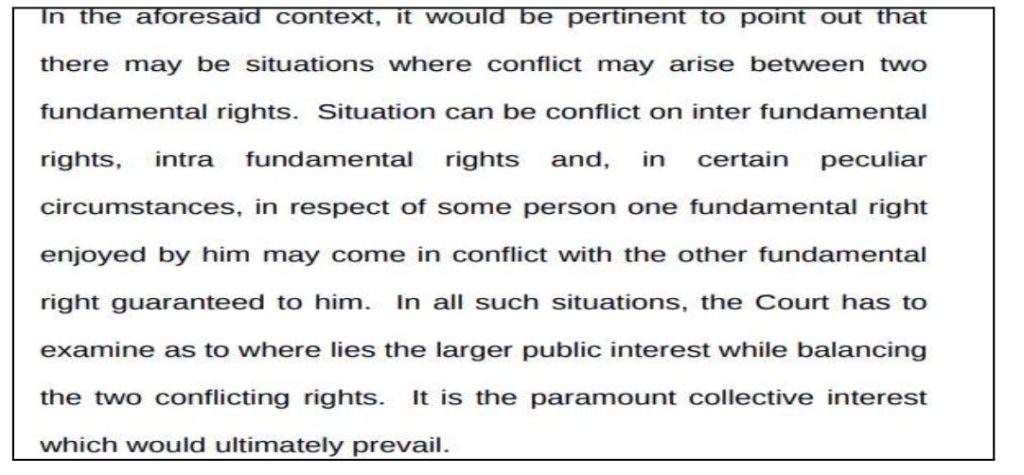
However, the Andhra Pradesh High Court differentiated between the protests by the government employees vis-à-vis protests by the citizens. It also observed that while courts look only from the legal lens, the whole idea of the protest is to draw the attention of the government to the issue.
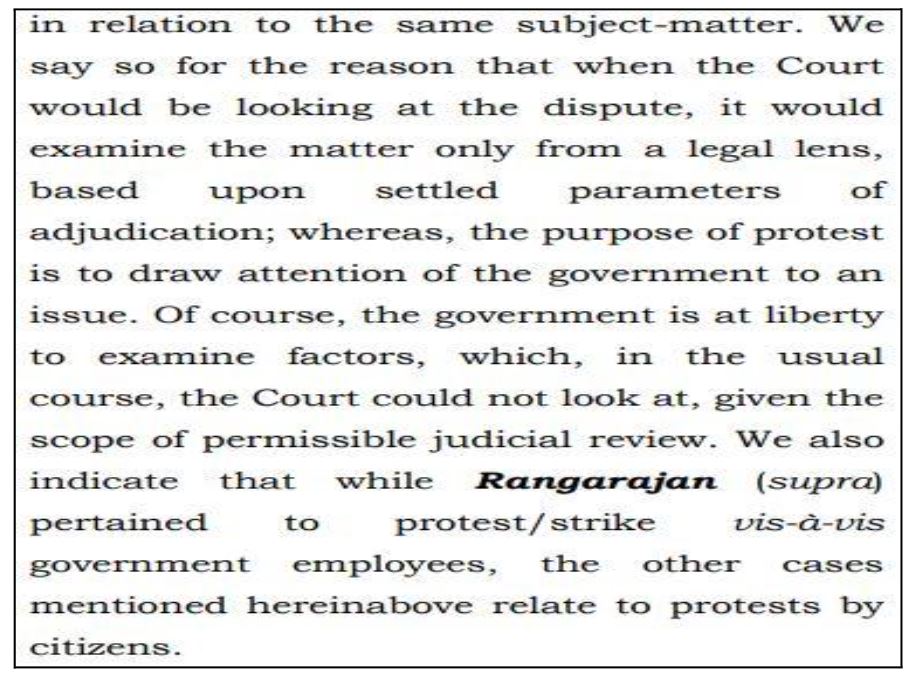
Keeping in all the above arguments, the court held that approaching the court would not disentitle the petitioner from protesting on the same subject matter.
Bombay HC: Slum Development Schemes to rehabilitate encroachers on same land a mockery of Public Trust Doctrine; must be done away with
In the case of High Court on its own motion (In the matter of Jilani Building at Bhiwandi) vs. Bhiwandi Nizampur Municipal Corporation & Ors, a bench headed by the Chief Justice of Bombay High Court Dipankar Datta and Justice G.S. Kulkarni, made strong observations regarding the building collapses and unauthorized structures. It invoked the public trust doctrine while making these remarks.
The Bombay High Court was hearing a Suo-Motu public interest litigation on ‘Jilani building’ collapse in Bhiwandi. The court was concerned with the growing unauthorized constructions and referred to the public authorities who shut their eyes to let this happen and thereby causing harm to the lives of innocents. The court had remarked that there is a proliferation of slums on public lands and sustained encroachment is encouraged to the benefit of private parties. In doing so, the court wondered, whether the ‘rule of law’ regarding the transfer of ownership from ‘State’ to private entities, prevails.
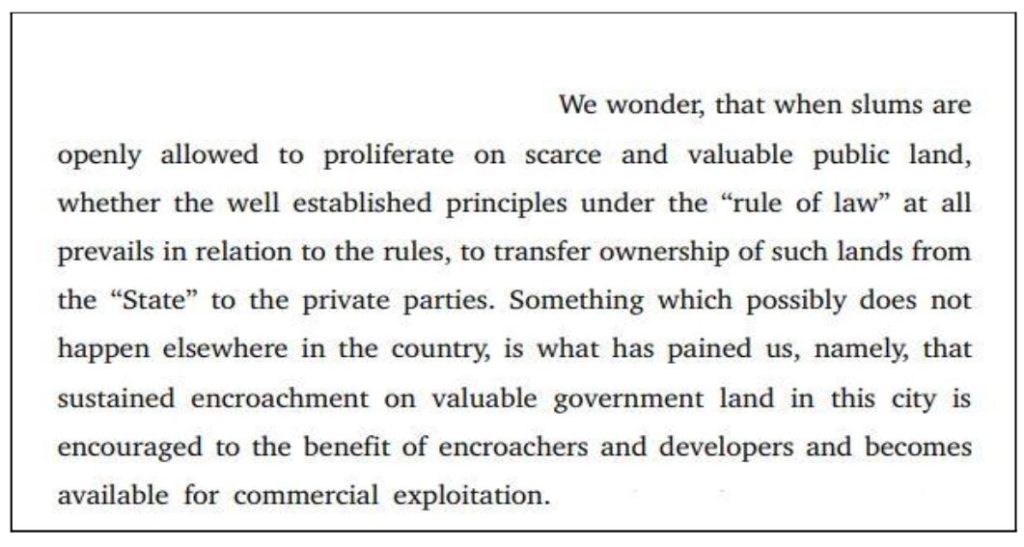
During the previous hearings, the court had asked the officials to submit data on the unauthorized constructions. Despite repeated instructions, the respondents did not follow the court order. Accordingly, the court remarked that:
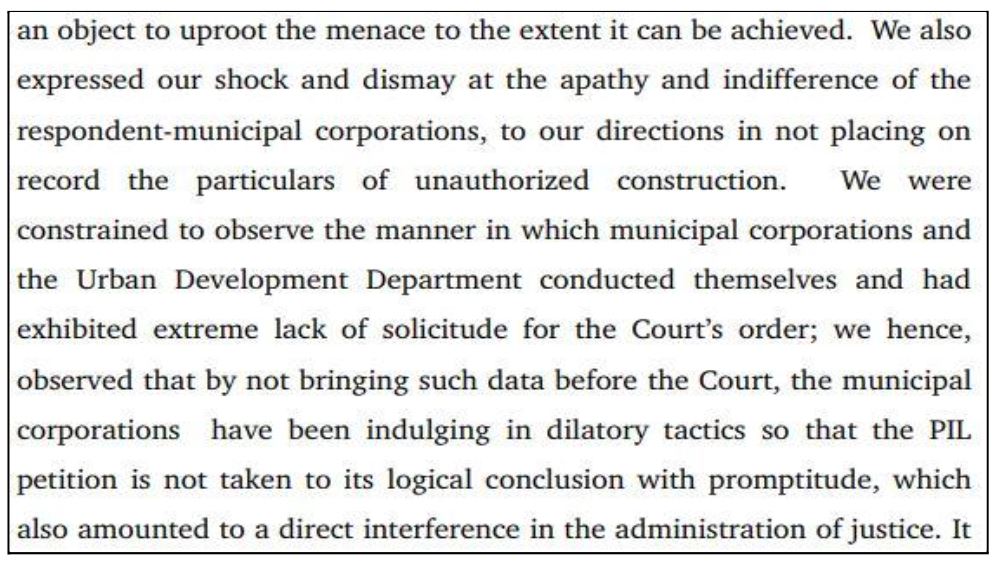
Following this, the court had appointed Judicial Commission under Justice J.P. Devadhar as Commissioner of Inquiry to inquire on these issues. The court, upon looking at the observations made by the commissioner, and the submissions made by the respondents, directed the principal secretary to initiate action against the officials and asked the officials to remove the encroachments and rehabilitate in any other part of the city.
The commissioner also highlighted the issue of land mafias and upon looking on the observations made by all the parties, the court has also highlighted the need for mass public housing and emphasized the right of the have-nots to a life with a dignity and to live in surroundings that are pleasant and liveable surroundings.
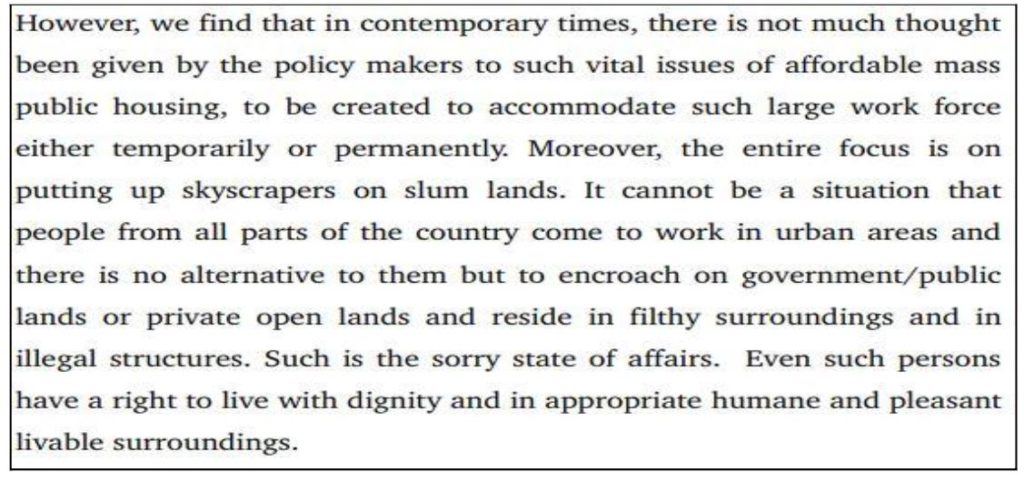
Manipur HC: Mere failure to maintain “True & Correct” account of election expenditure not ‘Corrupt Practice’ U/S 123(6) Representation of People Act, 1951.
During the hearing of a Shri Maibam Sarat Singh vs. Langpoklakpam Jayanta Kumar Singh & Ors., and other connected cases, a single bench headed by Chief Justice P.V. Sanjay Kumar, observed that mere failure to maintain a true and correct account of election expenditure would not per se amount to ‘corrupt practice’ under section 123(6) of the Representation of Peoples Act, 1951.
The court was hearing a petition filed by Laisom Ibomcha Singh, who secured second position in the 2017 Manipur State Legislative elections. The petitioner filed against Langpoklakpam Jayanta Kumar Singh on account for election expenditure. The petitioner mentioned that the respondent did not maintain a separate bank account for election expenses, wrongly mentioned about the government dues and failing to maintain proper account of election expenses.
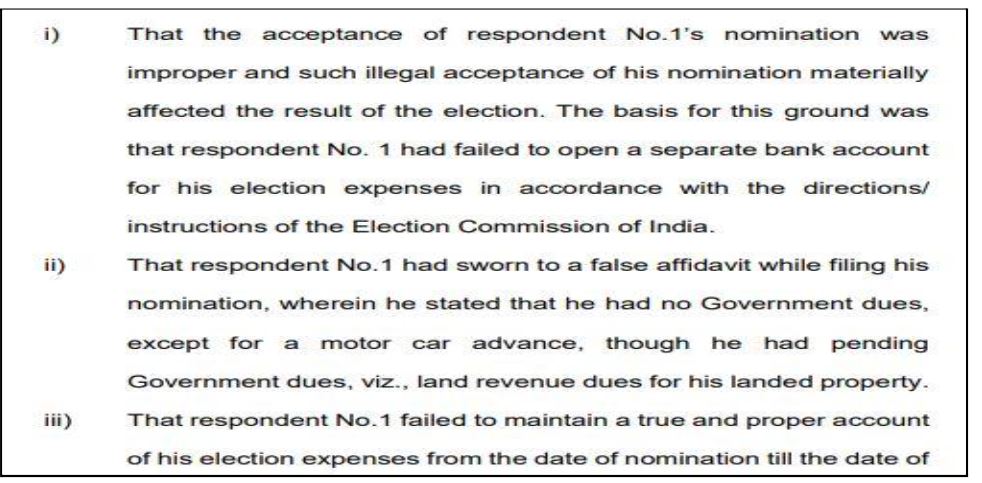
The petitioner argued that the section 77(1) of the Representation of People’s Act, 1951 (RPA) specifically mentions about maintaining a separate account of expenditure, which is linked to opening of a separate bank account. The court held that the date of filing nomination is not the same as the day on which the candidate is nominated. The question of maintaining separate bank account prior to filing nomination does not arise.
The court also made a note of the absence of evidence against the respondent as to whether he spent more than the allowed election expenditure. The RPA Act, 1951 mentions about ‘corrupt practice’ as any contravention to the section 77. In L R Shivaramagowda vs. T.M Chandrashekar (1998) case, the Supreme Court held that the corrupt practice under section 123(6) dealt with contravention of only section 77(3) and any violation with sections 77(1) & 77(2) will not fall in the scope of corrupt practice.
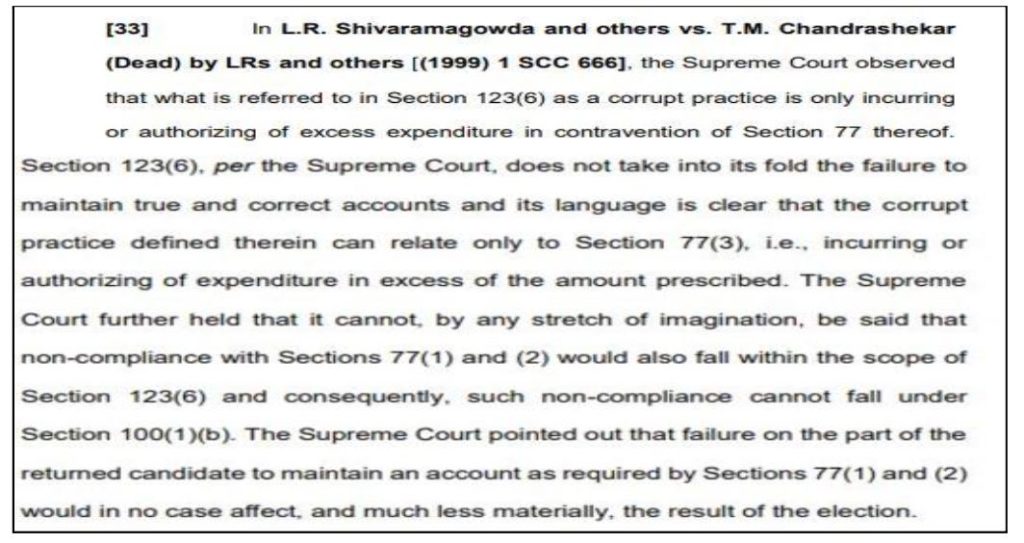
Keeping in mind the apex court’s decision and the failure of the petitioner to provide evidence for excessive expenditure than the prescribed limit, the Manipur High Court held that mere failure to maintain correct expenditure doesn’t translate to a corrupt practice under section 123(6) of the Representation of People’s Act, 1951.
Featured Image: Important Court Judgements


